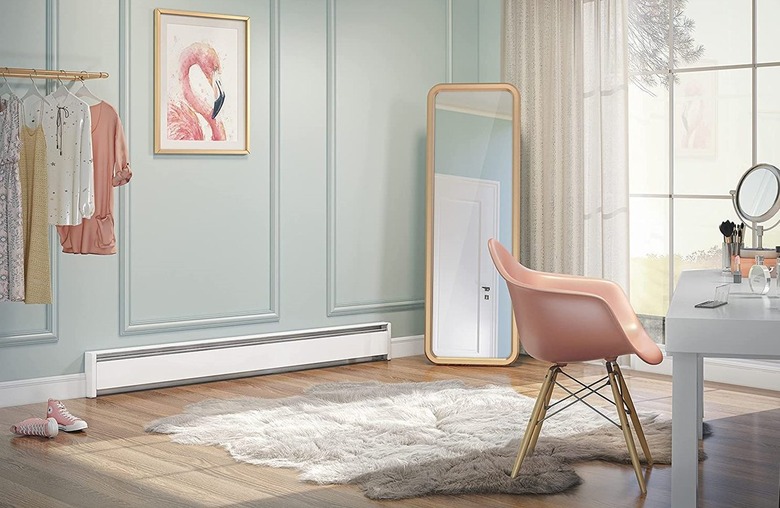Why Do Baseboard Heaters Make Noise?
We may receive a commission on purchases made from links.
Baseboard heating systems are generally a quiet and effective source of heat. These systems typically only make noise at the boiler while the water in the system is being heated. After the water is at a set temperature, these systems only create warmth. Electric baseboard systems should make no noise at all. However, from time to time, these systems can disturb a night's sleep with the sound of pinging, a constant ticking sound, or even banging. There are simple and easy ways to fix these sounds once you locate the problem.
Tip
The expansion and contraction of the baseboard and piping can create noise.
How Baseboard Heat Works
How Baseboard Heat Works
Understanding how things work is always a good step in diagnosing any problem. Hydronic (hot-water) baseboard heat is made up of copper pipe surrounded by aluminum fins. The water being heated at a boiler circulates the hot water through the copper pipe, and the aluminum fins dissipate the heat.
Convection of hot air moving toward cold air creates a convection type current of airflow (movement of air in which the heated air rises and colder air falls). This convection across the fins warms the space much like the way your turkey cooks faster in a convection oven, but with convection heaters this is done naturally without a fan. Electric heating baseboards do the same thing without the need of circulation pumps, boilers, or anything except for an electric heating element controlled by a high-voltage thermostat.
Where Does the Noise Come From?
Where Does the Noise Come From?
Metal expands and contracts when heated and cooled, and copper and aluminum expand a lot when heated. Add the fact that they are typically mounted in a metal housing, and you now have two different kinds of metals expanding and contracting at different rates, all while held inside a metal housing that is not moving at all. This will cause a sound until all three elements have settled; then the sounds begin again when things cool down.
Dirty or damaged fins can not only restrict convection airflow; they can also make noise. This noise can be due to the aluminum fins rubbing against one another as they heat up. The best way to handle noise coming from damaged baseboards is to clean and straighten the fins. However, too much damage may require replacement of the baseboard unit.
Some sounds may be not so much ticking, but more of a knocking or a hammering, which may be due to the water being too hot, air in the system, or possibly even water hammer caused by control valves. Air in a system can also give an aquarium-type sound that can either keep you up at night or create a sense of peace, depending on how you look at it. But even if you find the sound peaceful, it is not normal. A call to your heating expert should be your next move before your boiler becomes damaged.
Things To Look For
Things To Look For
Now that the physics lesson is over, it's time to put it to use. Take a look at what could be causing the noise. The biggest noise complaint generally comes from piping that has no room to expand. Copper pipe, as mentioned above, will expand and contract: Raising the temperature of water 100 degrees inside piping will cause 100 feet of copper pipe to expand over 1 inch, and PEX tubing (plastic tubing) can expand 10 times that amount.
Take a look inside your baseboard unit to see if there is enough room for the pipe to expand. Sometimes, it's the installation that causes the problem, which can be taken care of by either shortening the pipe or hanging it using hangers that dampen the sounds of expansion.
Heating System Installation
Heating System Installation
The problem may not be with the baseboard unit but with the installation of the piping feeding the heater. Check this piping between the boiler and the heater unit to make sure the pipe is well supported with hangers. Also, some baseboard heater units include plastic gliding hangers to help eliminate noise from expansion and contraction where piping enters and exits the unit. If your unit has these, make sure they are intact and in good condition; if not, contact the manufacturer for recommendations.
Knowing your system, how it works, and how it was installed will aid in the repair of noises coming from your baseboard heaters. When in doubt, a call to a professional might just end the sleepless nights.
